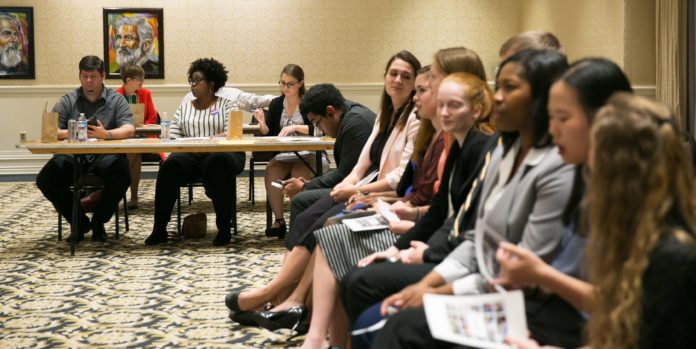
Since fall 2015, Mercer’s Visionary Student Panel (VSP) has helped bring big ideas for addressing real-world problems to life. An initiative of the University’s Quality Enhancement Plan (QEP)/Research That Reaches Out office, VSP started out as a crowd-sourced program where students gave presentations and funding was determined through audience voting. It has evolved over time to a more developmental process.
QEP associate director Hannah Vann Nabi described the program as a “socially conscious ‘Shark Tank,’” a reference to the long-running business-themed reality TV show on ABC. VSP is open to all students, regardless of age, experience or GPA.
Each fall, the QEP office puts out a call for applications with the prompt “If you could wave a magic wand and fix one problem in your community, what would it be?” Interested students submit an application with three to four sentences about each idea and discuss them with Nabi.
From there, the selected students conduct research and prepare five-minute pitches. They present their ideas at the VSP event in the fall, where they receive constructive feedback from a panel of judges, and then submit funding proposals. An appropriations committee determines which projects receive funding and how much they receive, and students have the spring semester to use the money they are awarded.
Students attend a grant workshop and get one-on-one coaching from Nabi throughout the process. Some need a lot of guidance, while others don’t need much help at all, she said. The experience provides them with a great addition to their resume as well as transferable life skills.
“I think this is a really valuable forum for students who are passionate enough and have the initiative to take their ideas to the next level,” Nabi said.
The QEP office has a budget of $4,500 for VSP each year and gives between $100 and $1,000 to the chosen projects, which range from public awareness campaigns to undergraduate service-research projects. A total of $17,775 in funding has been awarded to 32 different student-led projects since VSP began.
This year, eight of the 11 projects that were pitched received funding, including projects to improve the accessibility of lab classrooms for students with mobility issues, develop a device to alert opioid users to overdose symptoms, create multimedia content for a LGBTQ+ sensitivity training, and build relationships between incarcerated parents and their children.
Dr. Mary Alice Morgan, senior vice provost for service-learning and a VSP judge, said the students’ project concepts are quite profound.
“They have come up with such thoughtful, creative and innovative ideas, and to have this platform now empowers them to take action,” she said.
Sophomore Gunhee Lee, a biomedical engineering major, received funding for his project to create low-cost, custom orthotics through 3D printing for people with flat feet. Having flat feet himself, he knows the back pain that can come from standing and walking for long periods of time.
Lee is working with biomedical engineering professor Dr. Ha Van Vo, and Jeremy Barker, engineering electronic laboratory technician, to develop an orthotic with a unique, stackable design by which wearers gradually increase the height of the arch until they reach the support they need.

“Before this funding, it was just an idea,” Lee said. “With Visionary Student Panel, I could move with this idea faster and with more solid foundation. I can actually buy the proper materials that I think will work best.”
By using 3D printing, it will take a few hours rather than a few weeks to create a set of insoles, and the cost will be around $10 instead of hundreds of dollars, Lee said. He hopes to make and test several prototypes for the orthotic by spring 2020 and continue to improve the product until people can wear it.
Freshman Morgan Copeland received funding from VSP for supplies, refreshments and advertising for her “adulting” workshop series, which will teach Mercer students real-world skills.
Copeland realized there were a lot of things she was expected to know how to do as an adult that no one had ever taught her. In talking with her peers, she discovered she was not alone.
She plans to host six adulting workshops during the spring semester. Topics will include basic car knowledge, filing taxes, first aid and CPR, loans and leases. She will partner with a group on campus, such as Mercer’s car club, for each session.
“I’m really grateful that I get to do something like this,” said Copeland, a Spanish and neuroscience double-major. “I hope students take advantage of this opportunity, because this is their last chance to fill this gap. I hope these things are useful in their future.”
In previous years, VSP funding has gone to projects to produce a podcast for Mercer’s Real Talk speaker series, develop an app to try to reduce the incidence of hot car deaths, establish diabetes and hypertension support groups in rural communities, and create a curriculum to introduce Macon-Bibb County public school students to current events and pop culture in the Middle East.
Veronica Enchautegui and Mary Melissa Roland, 2018 Mercer graduates, organized an event called Teen Maze in March 2018 for their Service Scholars project. The event took two years of planning and was supported by funding from several sources, including VSP. More than 200 teens attended the event, which took participants to stations that represented various life choices and consequences.
“Because of Visionary Student Panel, we were able to have some incentives, such as T-shirts for the volunteers and goodies for the students,” said Enchautegui, who graduated from Mercer with a degree in chemical commerce.
The QEP office will transition to the Center for Engaged Learning after this academic year, and Mercer is looking into ways to sustain VSP in the future, Nabi said.










